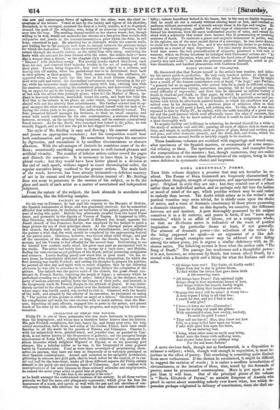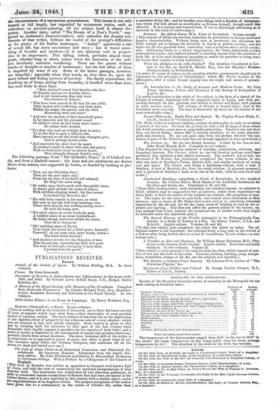DORA GREENWELL'S POEMS.
This little volume displays a promise that may not hereafter be re- alized. The Poems of Dora Greenwell are frequently characterized by independent thought, strength of expression, and appropriateness of ima- gery. Original in style they are not ; but they remind one of a school rather than an individual author, and so perhaps only fall into the fashion or mood of mind of the age, which peculiar writers may be said rather to embody than invent. The doubt which arises as to the writer's real poetical vocation may seem trivial, for it chiefly rests upon the choice of metre, and a want of dramatic consistency in those pieces possessing a dramatic character. But on this depends, we conceive, the difference between art and instinct. A poet thoroughly possessed by his subject conceives it in a fit entirety, and pours it forth, if not " teres atque rotundus," which is an affair of labour, yet as a congruous whole; so that an ill-chosen metre is indicative of the want of poetical inspiration on the particular theme at least, if not generally. The absence of dramatic power—the substitute of the writer for the being supposed to speak—is an argument of a like defi- ciency; and though examples enow may be adduced of this failing among the minor poets, yet it argues a similar deficiency with an chosen metre. The following extract is from what the author calls "The Song of Death." The passage has tenderness and a thoughtful power : it is not, however, an utterance by Death, bat verses about Death, by a mortal with a feminine spirit and a liking for what the Italians call con-
ceits.
"All things have rest ! Thy fruits, oh kindly earth !
Ripen from day to day in golden bloom, To find within the breast that gave them birth A life-renewing tomb.
"All things have Peace! Pale spiritual night
Brings sleep in that mysterious breast of hers, And wraps within her mantle darkly bright Each thing that breathes and stirs.
"Strange fate must still be mine! A weary lot— A deep repose I bring to all that live:
I yearn for rest, and yet I find it not;
I only give!
"I love—it loves me not—Humanity!
I hear its wailing cry amid the gloom: With outstretch'd arms, how swiftly, tenderly, To sooth its grief I come!
"They call me harsh! Alas, they know not how Life, as a song-lulled babe upon my breast, I take with quiet kiss upon the brow, To an enduring rest.
"I bring, when other none on earth may bring, Relief unto the frame with suffering worn, And shower balm from my ethereal wing For the sad heart forlorn."
A more obvious fault, though not so fundamental, is a disposition to exhaust a subject; which, though well enough in exposition, is most.in- jurious to the effect of poetry. This overdoing is something quite distinct from mere verboseness. If the diction be scrutinized, it might be difficult to suggest the excision of words ; it is rather a needless introduction of circumstances, or the iteration of ideas, that, tested by the demands of poetry, must be pronounced commonplace. More is put upon a sub- ject than it will bear. One of the principal pieces of the volume is "Maria Elizabeth of Parma," an amiable Empress of Austria who pined in secret about something nobody ever knew what, but which de- pression perhaps originated in delicacy of constitution, since she died on- der circumstances of a mysterious presentiment. This theme is not only treated at full length, but expanded by extraneous topics, such as reflections on portrait-painting, till the subject itself is almost for- gotten. Another piece, called "The Dream of a Poet's Youth," sug- gested by Andersen's Improvvisatore, only embodies the dreamy sen- timents of that writer, without the reality of the proteges difficulties or the poetry of his Italian landscapes. "Isabel," apparently a tale of actual life, has more consistency and story ; but it wants some- thing of breadth and incident—it is too minutely told in propor- tion to its importance. This failing, indeed, pervades almost every poem, whether long or short, unless when the limitation of the sub- ject absolutely restrains wandering. There are few pieces without marks of thought or touches of tenderness; but the full effect of these is impaired by want of art. Some of the better passages, however, are beautiful ; especially when they touch, as they often do, upon the more reflned and feeling sorrows of poverty. The family separations, the breaking up of home, arising from necessity, is handled more than once, but most truly in these lines.
"Ruin darken'd round that hearth—the face Of Poverty had grown familiar there;
And in her lineaments they only trace
The features of despair, "Who have been nursed in all that life can yield; Their basket still o'erflowing, and their store, Within the house, the garner, and the field, Abounding more and more!
"And now the shadow of their household peace Is far removid, and the pleasant sound
Of childish voices in that home must cease—
No echoes wake around.
"For they who used at twilight hour to strive To be tht first to gain a father's aide, Have learned to eat the bread that strangers give, And in strange homes abide.
"And scattered far, alas! how far apart, No mother's smile to cheer with love and praise, With no fond sister heart to answer heart, - They struggle through Earth's ways." The following passage, from "The Sabbath's Peace," is of kindred me- rit, and from a kindred source : the facts and the sentiments are drawn direct from nature, not suggested by books, or fancied by looking at pic- tures.
"Thou art our Christian feast!
Thou art the poor man's day ! From his six days of burden'd toll released, He flings his cares away. "He walks upon God's earth with thoughtful mien; In decent garb attends the house of prayer, With children clinging round; his face serene Is freshen'd by Heaven's air !
"His wife looks comely in his eyes, as when She took on her the well-kept marriage vow:
Times were that he was nothing among men—
He feels his being now.
"His spirit claims in social bonds its part, A kindred place in no mean brotherhood: He looks abroad, and owns within his heart, That all Is very good.
"Oh! rankling cares of Earth, Your bonds are loosed for a brief space; farewell!
Farewell! oh yet more vain, more weary, mirth—
The heart holds festival "And gladness hovers o'er the thoughts of men This blessed day, remembering Him who gave The hour of triumph,—bringing victory then, Uprising from the grave."



























 Previous page
Previous page